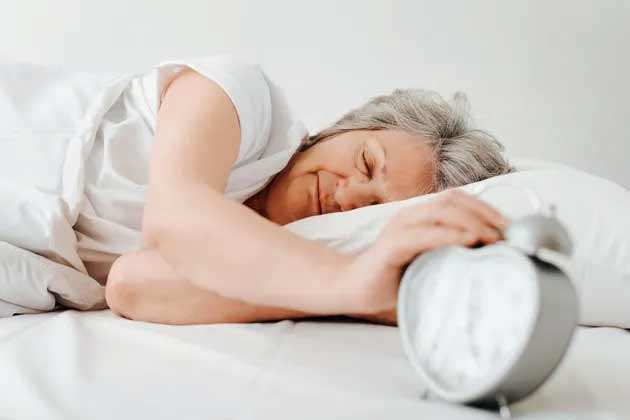
When it comes to building sustainable, healthy habits, we spend a lot of time focusing on our morning routine: nosh on a nutritious breakfast, mix in a meditation, add in a sweat session, etc. (You get the picture.)
If you hope to blow out birthday candles for many years to come, try incorporating these evening essentials listed by geriatrician Veronica Rivera, MD.
1. Keep a Consistent Bedtime
“Going to bed at the same time every night is part of good sleep hygiene and can help promote good sleep patterns and regularity,” Dr. Rivera says.
For one, sleep supports the immune system, she says. In fact, quality sleep may enhance the effectiveness of your body’s T cells, a type of white blood cell that helps fight infection, according to a February 2019 study published in the Journal of Experimental Medicine.
Over time, lack of sleep can also increase your risk for obesity, diabetes and cardiovascular disease, thereby sabotaging the healthy aging process, according to the Mayo Clinic.
Indeed, the structural and physiological processes that take place in the brain during sleep play an important role in memory consolidation and your ability to learn, problem solve and focus — all things necessary for your aging brain, according to Harvard Health Publishing.
2. Build Other Healthy Sleep Hygiene Habits
A consistent bedtime is just one piece of the sleep puzzle that promotes healthy aging. Other sleep hygiene habits are equally important if you want to age gracefully.
“Good sleep hygiene is essential to achieve the highest quality of sleep possible,” Dr. Rivera says. Her top sleep hygiene tips are:
- Avoid TV, reading and work in bed as these activities are stimulating (the same goes for scrolling on your phone)
- Limit alcohol and caffeine before bed
More Sleep Hygiene Habits
Already following the strategies shared by Dr. Rivera? Try these additional tips, per Harvard Health Publishing
- Use eye masks to block light
- Try white noise machines or earplugs to block noise
- Incorporate a relaxing pre-bed ritual such as taking a hot bath or meditating
- Ditch (or limit) daytime naps to ensure you’re sufficiently sleepy at bedtime
- If you can’t fall or stay sleep, get out of bed and do something that may make you drowsy (like listening to calming music) for 20 minutes before trying to go back to sleep
Sleep hygiene becomes even more crucial as we age. That’s because the “physiologic changes that occur with aging that may affect sleep for older adults,” Dr. Rivera says.
Indeed, older adults are more prone to problems falling and staying asleep. In advanced age, we tend to spend fewer hours in deep sleep.
We’re also more likely to struggle with sleep disorders (such as insomnia or restless legs syndrome) or sleep-sabotaging discomfort/pain related to chronic illnesses, according to the U.S. National Library of Medicine.
3. Eat a Healthy Snack Before Bed
If you normally get the munchies when the moon’s up, the snack choices you make can either help lengthen or limit your longevity.
For instance, a diet abundant in added sugars can contribute to chronic inflammation in the body, which is associated with serious health conditions like heart disease, obesity, cancer and diabetes, per Harvard Health Publishing. (Sorry to say, but you might want to reconsider that nightly ice cream cone or candy bar.)
Besides, sugary foods or those high in carbohydrates might negatively impact sleep, Dr. Rivera adds.
That’s exactly what an August 2019 study published in the American Journal of Lifestyle Medicine concluded. Researchers found that higher daily sugar intake was linked to lower sleep quality. (This study included 100 females between the ages of 19 and 23, however, the finding can apply to all ages.)
Tip
If your sweet tooth strikes before you hit the hay, Dr. Rivera recommends choosing healthier, nutrient-dense snacks such as fruit, nuts or low-fat yogurt.
4. Stretch
Stretching is a great addition to the nighttime routine that might ease the aging process.
Not only does a quick stretch before bed help reduce stress and increase relaxation (which are both beneficial for boosting sleep quality), but it can also aid in alleviating common aches and pains that come with age.
For example, “leg cramps are common complaints that often disrupt sleep for older adults,” Dr. Rivera says. In fact, nearly a third of adults above age 60 will experience at least one of these painful, involuntary muscle contractions in the calf, foot or thigh every two months, according to the Cleveland Clinic.
Leg cramps are more common as we get older because our tendons — the connective tissues that link muscles to bones — shorten as we age, per the Cleveland Clinic. Stretching can help offset some of this tightness and help limit leg cramps.
What’s more, nighttime stretching can help lower your risk of injuries and falls, in particular. This is especially important for healthy aging since every year, a quarter of older Americans will take a spill, and a fifth of these falls will result in a serious injury, such as broken bones or head trauma, according to the CDC.
5. Practice Single Leg Balance While Brushing Your Teeth
Standing on one leg while brushing your pearly whites before bed? OK, hear us out: Though it may sound strange, the simple act of shifting your weight to one leg while brushing your teeth is a wonderful way to support healthy aging.
Standing on one leg demands a level of balance. In fact, many daily tasks — from climbing stairs to stepping over a puddle — involve single leg balance. So, even if balance is not a primary goal while you’re young, the skill will be fundamental for independent living as you age.
Balancing exercises — like standing on one leg while brushing your teeth — can also help reduce your fall risk, per the CDC.
The exercise also requires multitasking and coordination, which can benefit your brain, too. And that’s super helpful for healthy aging. The more often you challenge your brain with new and engaging tasks, the longer it’ll continue to perform at its best, according to the University of Utah.
Tip
Remember to practice balancing for equal time on both legs (think: stand on one leg while you brush one side of your mouth, then switch to the other when you brush the opposite side).
6. Floss Your Teeth
While we’re on the subject of dental hygiene, flossing is another fantastic pre-bed ritual to add to your nighttime routine to promote the process of healthy aging.
Taking care of your teeth by flossing (and brushing twice) daily can keep bacteria that breeds in your mouth from reaching dangerous levels, which could cause serious oral infections, including gum disease, according to the Mayo Clinic.
How is this linked to longevity?
Overgrowth of bad oral bacteria, and inflammation from severe gum disease, may have harmful effects on overall health. More specifically, they may contribute to the development of diseases such as heart disease, clogged arteries, stroke, endocarditis (when the inner lining of your heart chambers or valves becomes infected) and pneumonia, per the Mayo Clinic.
Warning
If you experience pain and bleeding when flossing your teeth, you may have the beginnings of gingivitis or oral gum disease. Contact your dentist to make an appointment. Treatment may involve medicated toothpaste, rinses and soft-bristled toothbrushes.
7. Take a Walk After Dinner
Staying healthy in old age may simply require taking a few small steps — literally.
Going for short light-intensity walks after a meal can help decrease glucose spikes and improve blood sugar metabolism, according to a February 2022 systematic review and meta-analysis published in Sports Medicine. And we mean short — just aim for two to five minutes.
This is good news for people who must closely manage blood sugar levels, like those with diabetes or an insulin resistance. Just a small walk can work wonders for your cardiometabolic health and as a result, help to lengthen your lifespan.
Important Notice: This article was originally published at www.livestrong.com by Jaime Osnato where all credits are due.
Disclaimer
The watching, interacting, and participation of any kind with anything on this page does not constitute or initiate a doctor-patient relationship with Dr. Farrah™. None of the statements here have been evaluated by the Food and Drug Administration (FDA). The products of Dr. Farrah™ are not intended to diagnose, treat, cure, or prevent any disease. The information being provided should only be considered for education and entertainment purposes only. If you feel that anything you see or hear may be of value to you on this page or on any other medium of any kind associated with, showing, or quoting anything relating to Dr. Farrah™ in any way at any time, you are encouraged to and agree to consult with a licensed healthcare professional in your area to discuss it. If you feel that you’re having a healthcare emergency, seek medical attention immediately. The views expressed here are simply either the views and opinions of Dr. Farrah™ or others appearing and are protected under the first amendment.
Dr. Farrah™ is a highly experienced Licensed Medical Doctor certified in evidence-based clinical nutrition, not some enthusiast, formulator, or medium promoting the wild and unrestrained use of nutrition products for health issues without clinical experience and scientific evidence of therapeutic benefit. Dr. Farrah™ has personally and keenly studied everything she recommends, and more importantly, she’s closely observed the reactions and results in a clinical setting countless times over the course of her career involving the treatment of over 150,000 patients.
Dr. Farrah™ promotes evidence-based natural approaches to health, which means integrating her individual scientific and clinical expertise with the best available external clinical evidence from systematic research. By individual clinical expertise, I refer to the proficiency and judgment that individual clinicians acquire through clinical experience and clinical practice.
Dr. Farrah™ does not make any representation or warranties with respect to the accuracy, applicability, fitness, or completeness of any multimedia content provided. Dr. Farrah™ does not warrant the performance, effectiveness, or applicability of any sites listed, linked, or referenced to, in, or by any multimedia content.
To be clear, the multimedia content is not intended to be a substitute for professional medical advice, diagnosis, or treatment. Always seek the advice of your physician or other qualified health providers with any questions you may have regarding a medical condition. Never disregard professional medical advice or delay in seeking it because of something you have read or seen in any website, video, image, or media of any kind. Dr. Farrah™ hereby disclaims any and all liability to any party for any direct, indirect, implied, punitive, special, incidental, or other consequential damages arising directly or indirectly from any use of the content, which is provided as is, and without warranties.








